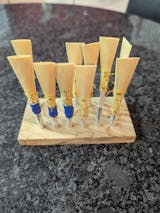Daily Maintenance / Tips
Soak Your Reed Before Playing
 Before playing soak your oboe reed in water whilst you put your oboe together. This will help the reed to be ready to play & to last as long as possible. We suggest always having a reed water cup in your case so that you are always able to soak your reeds no matter where you are.
Before playing soak your oboe reed in water whilst you put your oboe together. This will help the reed to be ready to play & to last as long as possible. We suggest always having a reed water cup in your case so that you are always able to soak your reeds no matter where you are.
Clean Your Oboe with a Swab After Playing
Cleaning your oboe after every playing is very important as it removes any saliva & debris that may have built up. Run a drop down swab through the instrument once before putting it away. Cleaning your oboe helps avoid the wood of the instrument rotting & it means that you won't have your oboe making popping sounds when you next go to play it, which is always a good thing!
Fortnightly Maintenance
Check that the Oboe Tenons Aren't too Stiff to Move
Check to see if the oboes tenons (joints) are stiff to move when putting them together and taking them apart. If they are put some cork grease on the cork and the ends of the joints to loosen them up a bit - don't put too much though as you don't want the oboe to slide apart in your hands.
For the More Fussy Cleaners...
Polish the Keywork in 5 Minutes
Using an impregnated silver polishing cloth briefly polish your instrument. We suggest you do no more than 5 minutes of polishing every two weeks so the silver isn't worn away. Never use liquid silver polish as this is very abrasive and will cause noticeable damage after prolonged use.
Brush the Dust off the Oboe
Using a natural hair paint brush, brush all the dust off the instrument, especially focusing on the areas where there is a lot of keywork. It is important to use a natural hair paint brush as most other types of paint brush are likely to lightly scratch the surface of the instrument.
Irregular Maintenance
Oil the Springs of the Instrument
Springs on every woodwind instrument keep all the keys moving and so it is important to look after them as they have to endure a lot of strain. Every now and then you need to oil the springs on the oboe with special spring oil. To do this apply the oil, using the needle applicator, to the part of the spring which rests on a piece of keywork. This helps to prevent corrosion occurring and will also make the oboes keywork slightly quieter.
If you have any questions about any of the above please pop me an email to esther@crookandstaple.com and we'll try our best to help!
|
|
Double Reed Expert at Crook and Staple |




